Russian money for the French National Front
The recent vortex of problems European Union has been spiraling in benefits populist and ultra-right political formations. Marine Le Pen, the head of the French National Front (NF), is well aware of this opportunity for her party which has a rich history of racist and anti-semitic proclamations.
In the upcoming French elections, Marine Le Pen intends to run for president and she will also try to score in regional elections. According to the Mediapart investigative magazine, a large part of the related NF campaigns are to be financed with a loan from a Russian bank with ties to the Kremlin. According to an anonymous member of the NF leadership, the loan amounts to 40 million euro. It is rather unusual for a political party to borrow money from a foreign bank. Some politicians and commentators have pointed out such loan could serve as a way to circumvent the ban on contribution to French political candidates from foreign governments and individuals. Marine Le Pen keeps denying the allegations of accepting a 40-million loan and labels these as imaginary. However, a sum of 9 million euro the NF has already received is openly admitted.
A 9-million loan has come from the First Czech-Russian Bank (FCRB) headed by Roman Popov, a Russian financier. The FCRB used to be owned by the Investment and Postal Bank (Investiční a poštovní banka - IPB) before the latter folded and it has no provable direct ties to the Kremlin. However, its owning structure points to persons who are close to the Russian government circles. According to certain sources which we haven't been able to verify, these ties reach all the way to the Russian intelligence services. The chain of connections that helped facilitate the loan is rather interesting. The deal was mediated by Jean-Luc Schaffhauser, a member of the European Parliament and a close NF collaborator who is on good terms with the Russian government as documented by his participation in the questionable European mission overseeing the separatist organized Donetsk and Luhansk elections. This mission was organized by the far-right Eurasian Observatory for Democracy and Elections (EODE) think tank which is led by Luc Michel, a Belgian fascist, in cooperation with the pro-Kremlin European Centre for Geopolitical Analysis (ECGA) co-founded by Mateusz Piskorski, a Polish far-right politician. Schaffhauser supposedly received over 100,000 euro as a payment for mediating the loan.
Mateusz Piskorski (on the right), Polish far-right politician and founder of ECGA, with Alexander Zakharchenko, the leader of the Donetsk separatists, in November 2014. The photograph illustrates the degree of impartiality of the organizers of the Donetsk election observation mission.
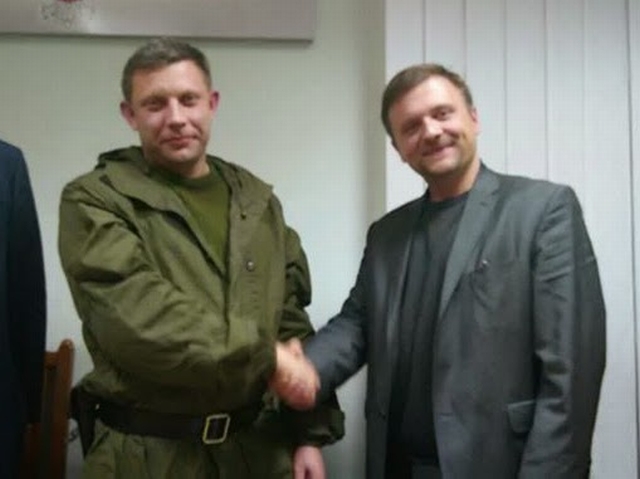
Mediapart identifies Alexander Babakov, a current pro-Kremlin member of the Russian parliament for the United Russia party and a former head of the far-right Rodina (Motherland) party, as the next instrumental person for the deal. Babakov has ties to the top tiers of Russian politics. By the way, Babakov is subjected to European sanctions related to the situation in the Ukraine. Schaffhauser allegedly introduced Marine Le Pen to Babakov and arranged their secret meeting with Vladimir Putin in February 2014. The realization of this encounter was also also aided by Dmitri Rogozin, current Russian deputy prime minister and founder of the Rodina party with French contacts.
Marine Le Pen and Dmitri Rogozin in Moscow in 2013
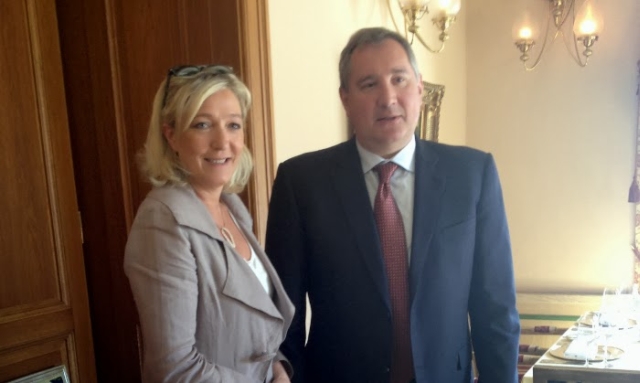
The loan from the First Czech-Russian Bank isn't the first loan the French National Front has taken. In April 2014, the NF received 2 million euro from the Cyprus-based Vernonsia Holdings with the help of Konstantin Malofeev, a Russian far-right oligarch, who has been subjected to European sanctions for financing pro-Russian paramilitary groups in eastern Ukraine since the summer of 2014. On behalf of Marine Le Pen, the contact with Malofeev was established by Aymeric Chauprade, her international-relations advisor, whom the NF sent to observe the referendum on the separation of Crimea from the Ukraine. According to the communications between Konstantin Rykov (a Russian media mogul and an active supporter of the annexation of Crimea by Russia) and Timur Prokopenko (an influential player in the department of internal politics of the Russian presidential administration and a former chairman of the Young Guard – the youth organization of the United Russia political party) made public by the Anonymous, Prokopenko was trying to bring Marine Le Pen herself as an observer of the Crimea referendum. However, Le Pen was busy with her election campaign tour and her place in the Crimea-election-observation mission was filled in by Chauprade who already had contacts in Russia. Chauprade keeps nurturing his ties to Putin's regime. In September 2014, for instance, Chauprade and Malofeev met as members of the presidium of the gay-bashing World Congress of Families.
According to the French Libération newspaper, Chauprade was invited to the observer mission by the aforementioned EODE think tank. Nevertheless, the National Front denies this information. Later when Marine Le Pen officially recognized the annexation of Crimea, Rykov wrote to Prokopenko: “We must express our gratitude to the French in some way. It is important we do so.” We can only speculate on how far his words went towards helping the National Front secure millions of euro in loans.
Gold, congresses and secret meetings
The news of the NF receiving Russian finances set off a wave of speculations that supporting a strong eurosceptic party which can undermine the integrity of the European Union is Putin's strategic move towards strengthening Russia's global political position. Moscow is aware of this effect, as is attested by a report by the Moscow Center for Strategic Communication which leaked at the end of 2014 and appeared in the German Bild magazine. The document entitled “Putin: The new leader of international conservativism” proposes the Russian president repeats the move he has played with the French National Front and creates ties with other European political parties, such as the rising German far-right eurosceptic Alternative for Germany (Alternativ für Deutschland – AfD). The way Putin should support this party is by making it an intermediary in gold trade. This information is very interesting in the light of the fact that AfD has really started trading gold in order to secure sufficient financial resources to qualify for the highest government campaign support. (In Germany, government provides financial support for political-party campaigns if the political party invests the same amount of its own money.) However, the party claims the gold it trades isn't Russian. Nevertheless, this information created a media scandal and subsequently, two representatives of AfD met with Vladimir Grinin, Russian ambassador in Berlin, who allegedly offered them strategic advice on dealing with the situation. Other representatives of the same party have met with the same diplomat a few months earlier. The AfD is mostly pro-Russian since its foundation. However when Russia annexed Crimea and the party had to take a clear stand on the situation, its ranks weren't united. Bernd Lucke, a founder and former head of the party, supported sanctions against Russia in the European Parliament while other AfD leaders insisted on taking a strictly pro-Russian stand. In summer 2014, German media reported that AfD was on the brink of splitting up because of disagreements regarding the stand it should take towards Russia. The actual split occurred only recently when Frauke Petry, a member of the ultra-conservative and pro-Russian faction, replaced Lucke as the party leader. The most vocal proponents of pro-Russian orientation in AfD include Alexander Gauland, a lawyer and journalist who is known to seek advice of Russian diplomats. According to the German media, their cooperation isn't limited to advice but includes offers of financial loans.
NF and AfD aren't the only political parties that are speculated to be courting Russian support. Europe is strewn with nationalists, eurosceptic and populist parties which cooperate and meet at events which are often supported by Russian oligarchs or political parties. An example of such meeting was a secret encounter in Vienna in June 2014 which was organized and paid for by the aforementioned Konstantin Malofeev. Information about this meeting was published by the Swiss Tages Anzeiger newspaper. Its participants included Aleksandr Dugin, an influential ideological leader of the Russian far-right and the founder of the National Bolshevik Party. A few months later, a “peace conference” took place in a luxury hotel in Berlin. Its aim was to explain the relationship of Russia to Ukraine and it was attended by representatives of AfD and the National Democratic Party of Germany (Nationaldemokratische Partei Deutschlands - NPD) among others. The main presentation was delivered by Vladimir Yakunin, the former head of the Russian Railways and a close collaborator of Vladimir Putin, who is known for his hard-line religion-based homophobic views. Other similar meetings are regularly attended by the Bulgarian Ataka nationalist party, Hungarian Jobbik, Greek Golden Dawn and the Freedom Party of Austria (Freiheitliche Partei Österreichs - FPÖ).
Aleksandr Dugin speaking at a meeting of the National Bolshevik Party in 1996.
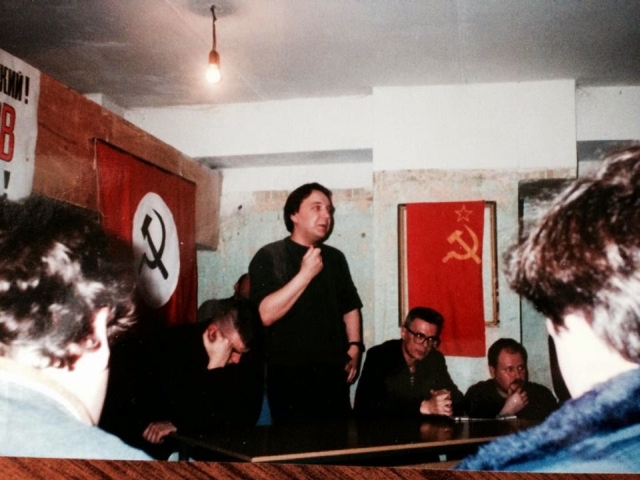
The largest event which brought together ultra-nationalist parties from the EU and Russia was the International Russian Conservative Forum in March 2015. The event was organized by the Russian Rodina (Motherland) party which is connected to the top positions in the State Duma through its leaders. The purpose of the Rodina party is to be “the President's special purpose unit”. The forum's attendees included representatives of NF, NPD, Golden Dawn, Ataka, Italian New Force (Forza Nuova - FN), the British National Party (BNP) and a number of Russian neo Nazis. A detailed report on the event was published by A2larm (in Czech).
Nick Griffin, Udo Voigt and Roberto Fiore at the International Russian Conservative Forum.
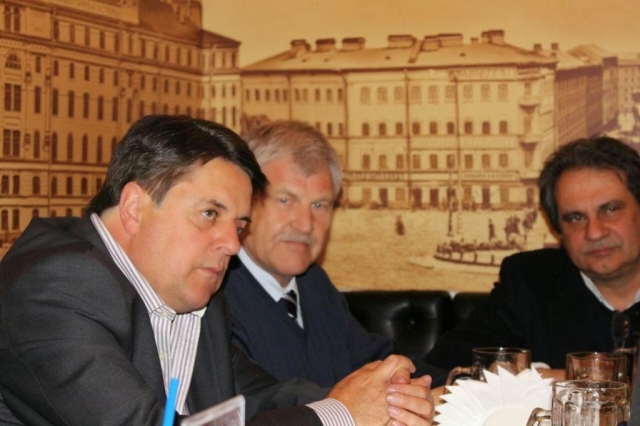
Recently, many commentators have started noticing that leaders of European nationalist parties frequently express their support of the Russian regime (and thereby support of Vladimir Putin) and they often visit Moscow. A study devoted to this phenomenon has been presented by the Hungarian Political Capital institute last year. According to this study, most European nationalist parties openly support the current Russian politics. Actual quotes by leaders of such parties illustrate this situation. Roberto Fiore of Forza Nuova described Russia as a “model civilization” for defense of Europe against banks and immigrants. Lorenzo Fontana of the North League (Lega Nord - LN) sees Russia as a role model for defense of the family and national identity. Gábor Vona, the leader of Hungarian Jobbik, mentions Russia as a guardian of the European heritage. Even Marián Kotleba of People's Party – Our Slovakia (Ľudová strana Naše Slovensko - ĽSNS) has expressed his support of Viktor Janukovič, the pro-Russian former president of the Ukraine. The question is to what extent these European parties are truly impressed by Russian politics and to what extent their statements amount to courting of political partnerships or even fulfilling contractual obligations. The fact is that the media has already published substantiated accusations of Hungarian Jobbik, Bulgarian Ataka, Slovak ĽSNS and other parties maintaining financial ties with Russia.
Money doesn't stink
Marine Le Pen is very popular with Czech nationalists. For example, Adam B. Bartoš, the head of National Democracy (Národní demokracie - ND), congratulated Le Pen on her election success with an obsequious letter which exuded the author's desire to push himself into the spotlight. Later, Bartoš sent Daniel Solis to lobby with the secretary of National Front for cooperation between their parties. The real fun only began shortly after the news of the suspicious financing of NF surfaced. Czech populist and nationalist parties started outdoing each other to be the ones who bring Marine Le Pen to Prague on an official visit. The prize for the winner wouldn't be just symbolic support anymore - it could also entail a share in the Russian loan for the National Front as the French party might need a Czech connection with the First Czech-Russian Bank or its European-Russian Bank subsidiary. For some time, Tomio Okamura seemed to be close to winning the race. His former colleagues from the Úsvit (Dawn) political movement headed by Marek Černoch were also trying hard but eventually, the Citizen's Conseravative Party (Občanská Konzervativní Strana – OKS) emerged the winner. The OKS is headed by Jiří Janeček who is known for submitting a proposal for setting up a concentration camp for the homeless on behalf of the Prague ODS in 2010. Janeček's affection for the NF is no secret. In the last election, he adopted an NF slogan (“No Maydan in Prague”) and last March, he pompously announced that OKS was the sole political partner of the NF in the Czech Republic. In November 2014, Janeček attended the NF congress in Lyon along with representatives of Ataka and Forza Nuova. In May, Marine Le Pen eventually arrived in Prague to attend the European Peace And Prosperity For EU conference organized by OKS at the House of Representatives. Other attendees included Tom Van Grieken and Gerolf Annemans of the Belgian Flemish Interest (Vlaams Belang - VB) nationalist party and Johannes Hübner of the Austrian FPÖ. Tomio Okamura and Radim Fiala of the newly founded Freedom and Direct Democracy (Svoboda a přímá demokracie - SPD) party also came to flash their smiles. The conference speeches mostly criticised European sanctions against Russia. The actual meeting of Jiří Janeček and Marine Le Pen was rather uninteresting apart from Le Pen's statement denying the purpose of her visit was to find Czech contacts which would facilitate finances from the First Czech-Russian Bank. It is more interesting to note that while in Prague, Marine Le Pen met with former president Václav Klaus, who has been openly moving towards a nationalist and far-right position since his final exit from the presidential office. There are also speculations that Klaus helped cover up the tunneling of the Investment and Postal Bank (Investiční a Poštovní Banka - IPB) which was the forerunner of the First Czech-Russian Bank. Recently, Klaus was reported to be expected to appear at this year's Dialog of Civilizations conference organized by the Russian oligarch Vladimir Yakunin. The event may have interesting implications for Tomio Okamura. According to the Právo newspaper, the National Front is displeased by Okamura's alliance with Adam B. Bartoš including speeches at Bartoš's demonstrations one of which attracted media attention due to gallows for traitors of the nation being brought on site. Such publicity could hurt Le Pen's image. Therefore, the chances of Okamura's party being allowed to join Le Pen's newly founded Movement for Europe of Nations and Freedom (MENF) are threatened. Ludovic De Danne, Le Pen's secretary, told the Právo newspaper: “We wished to cooperate with Mr. Okamura but we are waiting for [a confirmation of] proofs of his ties to extremist groups. If these are confirmed, then of course we won't accept his application.” The only Czech member of MENF is Jiří Janeček's OKS.
Jiří Janeček (on the left) welcomes Marine Le Pen in Prague. Tomio Okamura is standing behind them.
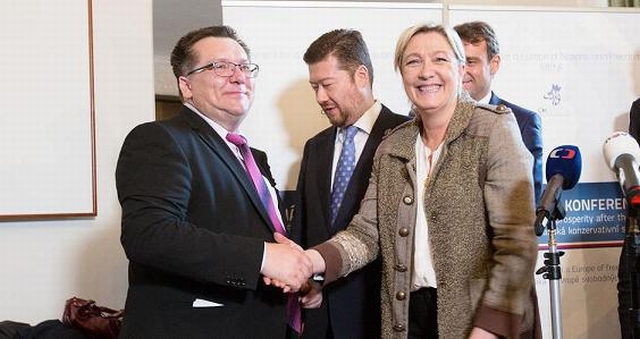
Soon after Le Pen's visit to Prague, OKS launched a campaign for a referendum about secession of the Czech Republic from the European Union and published a proclamation about the necessity of lifting the sanctions against Russia. Was it just a coincidence? The referendum campaign was also supported by Bartoš's National Democracy until Jiří Janeček labeled the party xenophobic, extremist and antisemitic. At that point, Bartoš backed out of the partnership. Nevertheless, National Democracy remains strongly pro-Russian as documented by an interview Adam B. Bartoš has given to the Russian Stoletie site: “Of course there are many other parties and organizations we like, such as Rodina or the recently founded Great Fatherland Party which is led by Nikolai Starikov, or the National Liberation Movement. It is highly understandable that we appreciate Mr. President Putin whose role in domestic but also international politics, especially in the most recent years, is very positive and I won't exaggerate too much if I state that Vladimir Putin ranks among the greatest rulers in Russia's history”. Ladislav Zemánek, OKS deputy chairman, a former functionary of the Union of Young Communists and currently, an enthusiastic far-righter, participated in the “independent” observer mission of the elections in Luhansk and Donetsk” mentioned a few paragraphs earlier in connection with the involvement of Jean-Luc Schaffhauser.
A press conference of observers of elections in Luhansk and Donetsk.
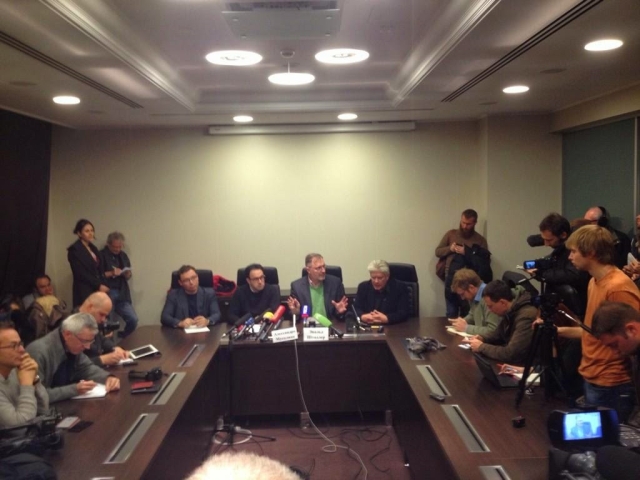
Peace in brown
The Worker's Party of Social Justice (Dělnická strana sociální spravedlnosti – DSSS) didn't stay behind in seeking Russian contacts and joined the Alliance for Peace and Freedom (APF) this year. APF is a pan-European project of nationalist parties. It started germinating in September 2014 and was officially founded in Brussels in January 2015. The founding meeting was presided over by Nick Griffin, a well-known British fascist with many years of activity who served 7 months in prison for publishing an antisemitic article in 1998. A year later, he became the head of BNP. Griffin had held this position until he recently founded a new party called British Unity. Roberto Fiore of the Italian Forza Nuova was elected chairman of APF. Fiore is no saint either. In the 1980's, he was implicated in a neo Nazi bomb attack on the Central Station in Bologna. Afterwards, he left for the UK where he started cooperating with Griffin and the BNP. After his return to Italy in 1997, Fiore co founded the fascist Forza Nuova party. However, Fiore became known mainly as the head of the European National Front. Jens Pühse was elected the secretary general of APF. Pühse is a key foreign-relations figure of the German NPD and an established character of the international neo Nazi scene. Recently, we have mentioned Pühse in connection with his planned appearance at an anti-immigration demonstration in Prague (in Czech). Let's just repeat that Pühse runs a mail-order store with neo Nazi music, he was a member of the banned German National Front and he has been a member an activist of the NPD for many years. The APF board includes members of the Greek neo Nazi Golden Dawn and the Spanish National Democracy (Democracia Nacional - DN). Kris Roman, a Belgian neo Nazi and an antisemitic activist, attended the APF founding meeting as a guest of honor. Roman used to be active in the Flemish Block (Vlaams Blok) and currently, he works for the Russian Euro Rus think tank which tries to unite Russian and European nationalist organization in their fight against immigration.
Nick Griffin in a White Power T-shirt in a well-known photograph from his National Front era
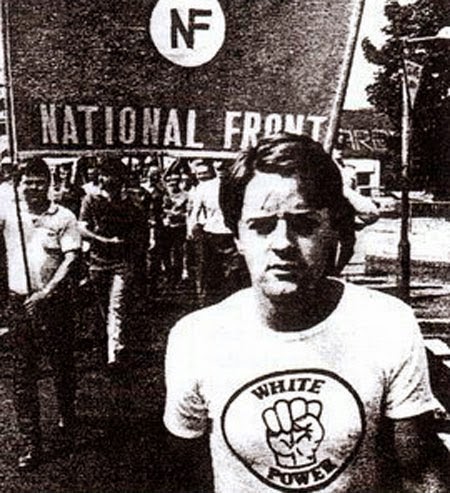
If we briefly summarize the APF program based on the few press releases the organization has published so far, it comes down to criticism of the policies of USA, NATO and criticism of anti-Russian sentiments. The APF clearly supports the Russian claim on Crimea, condemns sanctions imposed on Russia, etc. One of the first events APF representatives officially attended was the aforementioned International Russian Conservative Forum in St. Petersburg. In the light of this information we see a looming question: where does APF get money for its activities and whom does it actually serve? Apart from comments on international politics, APF's Facebook profile stays in line with the orientation of its member organizations by occasionally publishing an anti-LGBT post or a motivational meme of the “Europe for Europeans” sort.
DSSS at the second APF congress in Brussels. From the left: Sojka, Lamprecht, Štěpánek, Vandas, Rint.
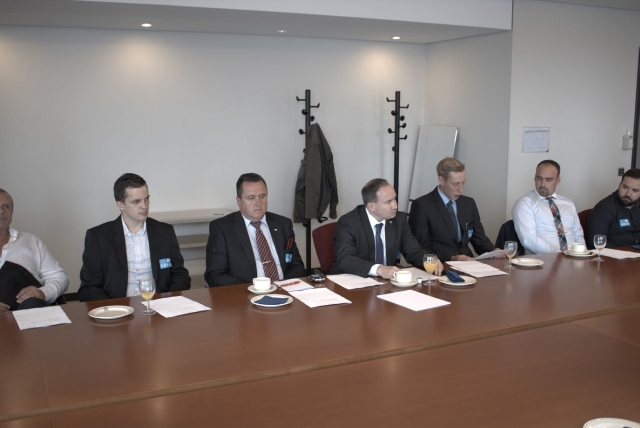
After discussing the possibility of its membership in the APF for some time, the DSSS officially joined the alliance at its second conference in Brussels on June 16, 2015. DSSS sent a numerous delegation to the event which included its top senior members Tomáš Vandas and Jiří Štěpánek as well as representatives of Young Workers, its youth organization, Erik Lamprecht and Hynek Rint. Libor Sojka, the national chairman of the DSSS negotiations committee, also turned up. The conference was supposed to host “Russian academics” which meant Alexander Sotnichenko, a member of the Rodina (Motherland) party leadership and Fiodor Biryukov, the ideologist of an obscure nationalist club entitled Stalingrad. However according to the APF, the European Parliament banned the two academics from entering its premises which led the participants of the congress to organize a small protest which involved them standing in front of the European Parliament building with banners that read “Stop Russophobia”. The fact that Vandas has started riding the Russian wave is interesting because as recently as in February 2014, he was praising the Ukrainian Right Sector and wanted to invite its representatives to the Czech Republic (in Czech).
Paid xenophobia?
No doubt you have noticed this article is based on many speculations. Unfortunately, there is no other option in this case. The subject of this article is a game in the top political tiers and its players are very careful. Nevertheless, there is a long list of clues that indicate the Russian leaders are interested in destabilizing the EU and weakening its international position by supporting European nationalist and populist parties which spread fear, distrust and hate. This article only summarized some of these indicators.
In the recent months, the Czech Republic has seen a bonanza of anti immigration and anti Islamic protest organized or co organized by DSSS, ND, OKS and Okamura's SPD. It seems legitimate to ask whether these events could have been at least partially made possible by new international links which ultimately lead to the Russian government. Is it possible that DSSS acquired new financial resources by joining APF? Could the National Democracy have tapped into the same source by publicly supporting Putin's regime, legitimizing questionable elections in Donetsk and Luhansk by its participation in observer missions, and by courting Marine Le Pen? Could the partnership of Janeček's OKS with the French National Front go as far as to open access for the Czech party to financing from the First Czech-Russian Bank? What are the real reasons for Marine Le Pen's visit to Prague which is planned for fall 2015? These are unanswered questions we should be paying attention to.